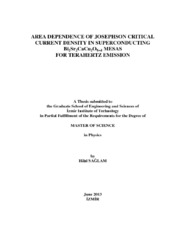Please use this identifier to cite or link to this item:
https://hdl.handle.net/11147/3573Full metadata record
| DC Field | Value | Language |
|---|---|---|
| dc.contributor.advisor | Özyüzer, Lütfi | en |
| dc.contributor.author | Sağlam, Hilal | - |
| dc.date.accessioned | 2014-07-22T13:51:50Z | - |
| dc.date.available | 2014-07-22T13:51:50Z | - |
| dc.date.issued | 2013 | en |
| dc.identifier.uri | http://hdl.handle.net/11147/3573 | - |
| dc.description | Thesis (Master)--Izmir Institute of Technology, Physics, Izmir, 2013 | en |
| dc.description | Includes bibliographical references (leaves: 75-80) | en |
| dc.description | Text in English; Abstract: Turkish and English | en |
| dc.description | xii, 80 leaves | en |
| dc.description.abstract | There are numerous application fields of terahertz waves such as airport screening of passengers for weapons, explosives, drugs, secure wireless communications, cancer detection, etc. high-Tc superconductor Bi2Sr2CaCu2O8+δ (Bi2212) single crystal has been observed as an intense, coherent, continuous electromagnetic wave source in terahertz frequency region. Bi2212, which is highly anisotropic high-Tc superconductor, is considered as a stack of intrinsic Josephson junctions (IJJs) on atomic scale. In this study, we have fabricated triple mesa structures on a same chip with various mesa areas (300x50, 200x50, 100x50 μm2). Firstly, single crystal of Bi2212 is glued onto a sapphire substrate from its smooth a-b surface by silver epoxy. After deposition of 100 nm Au layer, rectangular mesa structures were fabricated on the surface of an under-doped Bi2212 crystal by using e-beam lithography and Ar-ion etching step by step. On account of the difficulties in making a contact on small area of the mesa, CaF2 insulating layer deposition was performed. After that, a gold stripe with the width of 30 μm was created by lift-off technique on the mesa and CaF2 layer. Finally, three gold probe wires were connected to the two contact paths and mesa by silver epoxy. After the mesa fabrication, the exact dimensions of the mesas were obtained using atomic force microscope. To obtain the electrical characterization, c-axis resistance versus temperature (R-T), and current-voltage behavior (I-V) were measured. From I-V characteristics, critical current of each mesa structure having different dimension was obtained, after that, we have calculated the critical current densities of each mesa structure and then we have studied change in Josephson critical current density of mesas with different dimensions. We can conclude from the I-V measurements of the mesas that the Josephson critical current density is decreasing when the area of mesa is increasing. Furthermore, the backbending voltage points are increasing since heating effects dominate for the large areas of the mesa structures. | en |
| dc.language.iso | en | en_US |
| dc.publisher | Izmir Institute of Technology | en_US |
| dc.rights | info:eu-repo/semantics/openAccess | en_US |
| dc.subject.lcsh | Terahertz technology | en |
| dc.subject.lcsh | Terahertz spectroscopy | en |
| dc.subject.lcsh | Superconductors | en |
| dc.subject.lcsh | Josephson junctions | en |
| dc.title | Area dependence of Josephson critical current density in superconducting Bi2Sr2CaCu2O8+d mesas for terahertz emission | en_US |
| dc.type | Master Thesis | en_US |
| dc.institutionauthor | Sağlam, Hilal | - |
| dc.department | Thesis (Master)--İzmir Institute of Technology, Physics | en_US |
| dc.relation.publicationcategory | Tez | en_US |
| item.grantfulltext | open | - |
| item.openairecristype | http://purl.org/coar/resource_type/c_18cf | - |
| item.cerifentitytype | Publications | - |
| item.openairetype | Master Thesis | - |
| item.languageiso639-1 | en | - |
| item.fulltext | With Fulltext | - |
| Appears in Collections: | Master Degree / Yüksek Lisans Tezleri | |
Files in This Item:
| File | Description | Size | Format | |
|---|---|---|---|---|
| T001106.pdf | MasterThesis | 3.49 MB | Adobe PDF |  View/Open |
CORE Recommender
Page view(s)
132
checked on Apr 22, 2024
Download(s)
68
checked on Apr 22, 2024
Google ScholarTM
Check
Items in GCRIS Repository are protected by copyright, with all rights reserved, unless otherwise indicated.